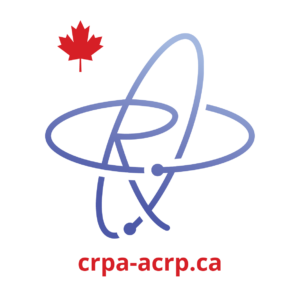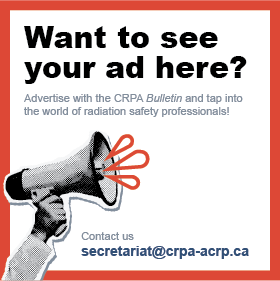Préparation à la désignation (A)ACRP, février 2023
Résumé :
Dans cette édition, nous avons invité des gens qui se sont récemment préparés à l’examen d’agrément (A)ACRP et qui l’ont réussi à nous parler de leur expérience.
Devin Sullivan
Devin est le spécialiste en radioprotection principal chez WSP Golder Canada où il travaille sur de nombreux projets de déclassement nucléaire et d’assainissement environnemental. Il enseigne également dans le programme de radioprotection pour technicien au Loyalist College.
Laila Omar Nazir
Laila a complété son baccalauréat en physique médicale et sa maîtrise en radioprotection à l’Université McMaster. Après avoir travaillé dans l’industrie nucléaire et le secteur médical, elle est retournée à l’Université McMaster dans son poste actuel de spécialiste en radioprotection.
Nous leur avons demandé de nous dire pourquoi ils ont décidé de passer l’examen, comment ils se sont préparés, quelle était leur stratégie pour passer l’examen et quels conseils ils donneraient aux gens qui voudraient passer l’examen.
![]() In this issue, we’ve invited a couple of people who recently prepared for and successfully completed the CRPA(R) registration exam to tell us about their experiences.
In this issue, we’ve invited a couple of people who recently prepared for and successfully completed the CRPA(R) registration exam to tell us about their experiences.
Devin Sullivan
Devin is the senior health physicist at WSP Golder Canada, where he works on a number of nuclear decommissioning and environmental remediation projects. He also teaches in the Radiation Safety technician program at Loyalist College.
Devin completed his bachelor’s in health physics at McMaster University. He joined CRPA as a student in 2017 and obtained his CRPA(R) in 2022.
Following are Devin’s reflections.
Why did you write the exam?
My primary motivation for writing the CRPA exam was because the CRPA(R) designation is one of the few certifications outside of a relevant degree. As a consultant and contractor, this designation helps clients feel confident when they see that you have certifications by third parties.
Before you can write the exam to become a certified health physicist (CHP) through the American Board of Health Physics, you must have at least six years of professional experience in health physics. Until you achieve that, the CRPA(R) is an obvious choice for certification.
In addition to employer benefits, the CRPA(R) community connects people to professionals throughout the industry in Canada (and abroad) who have collective experience across a broad range of projects. As the company I work for has very few physicists or radiation professionals, it’s helpful for me to get experienced opinions on things I’m not sure about and to have the chance to ask questions.
The opportunity for continuing education and to have an impact on future professionals is a big reason I decided to write the test.
How did you prepare for the exam?
I started studying the same way I’ve studied for essentially every exam I’ve ever taken—about two days before the test. (I do not recommend this!)
My first step was to take a look at all of the practice material available, the questions from the competency document, some CHP examples, and National Registry of Radiation Protection Technologists examples. Being comfortable with those questions and the style of questions, I moved onto the legislation.
As the majority of the legislation would be provided during the exam, I browsed through the topics covered in each document so that I would know where to look for answers. The most important document that would not be provided was the International Atomic Energy Agency (IAEA) Safety Standards Series No. SSR-6, and this took up the bulk of my study time. I made sure I knew
- definitions for different types of shipments,
- how to calculate the Transport Index (TI),
- what the maximum TIs were for different categories,
- maximum dose rates, and
- special circumstances.
What was your strategy for writing the exam?
When I wrote the exam, I started at the beginning and went through every question; if I wasn’t certain of the answer or in which document to find the answer, I marked the number and moved on to the next question. During my next pass, I focused on questions I knew would be in one of the provided documents; this took up some time, but looking through a few documents to be certain in your answers is a more effective use of time than making a guess.
During subsequent read-throughs, I was able to figure out the answers to some of the questions I wasn’t certain of and I could get the right answer or make a more educated guess.
Finally, I went through the other questions I had not yet been able to answer. Most offered some more obvious choices, so I could whittle down the options. Fortunately, there’s no penalty for wrong answers, so it helps to have luck on your side!
If you’re writing at the conference, the test is on the first day. The committee is quick to let you know the outcome so you can put the test behind you. Take the opportunity to network, learn and watch all of the interesting panels, and enjoy the rest of the conference!
Laila Omar Nazir
Laila completed both her BSc in medical physics and MSc in health and radiation physics at McMaster University. After working in the nuclear industry and medical sector, she returned to McMaster in her current role as a health physicist. She obtained her CRPA(R) in 2022.
Following are Laila’s reflections.
Why did you write the exam?
As the highest competency level in Canada, the CRPA(R) designation has been a long-time career goal of mine since I joined CRPA as an undergraduate student member. Professional development and connecting with other registered members were two major factors in my decision to write the exam. Additionally, the designation provides validation by a third party against a defined standard, and provides confidence to my employer as well as the groups I support (including those external to my organization).
How did you prepare for the exam?
When it comes to preparing for the exam, I started early. I focused on the regulations; even though I knew they would be provided during the exam, I wanted to minimize any time spent shuffling through the many pages. I went through all the regulations in detail at least twice.
I also read the Nuclear Safety and Control Act from start to finish. (Note: this was not necessary.) I definitely over-prepared for the Nuclear Safety and Control Act and associated regulations; the exam questions regarding legislation were not as detailed as I anticipated.
For a practising radiation safety professional, a single read-through of the regulations should be sufficient.
Having previously completed my Transport of Dangerous Goods (TDG) Class 7 training, I didn’t focus on the TDG regulations or the IAEA SSR-6 in as much detail. I reasoned that a high-level overview would be sufficient for this section as these documents were not provided for the exam, and/or would only comprise a small percentage of the exam. This assumption proved to be incorrect—if you are thinking of writing this exam, please familiarize yourself with the IAEA SSR-6, including definitions.
What other advice would you give to someone thinking about writing the exam?
To prepare for the exam, I recommend going through past articles in the CRPA Bulletin (see the regular feature aptly titled CRPA(R) Prep) as they give you a good idea of the exam questions and the format (along with the process document, of course).
I found the hours provided to write the exam to be generous, but budget enough time to ensure you filled in your answer sheet correctly!
Vous voulez lire d’autres articles comme celui-ci ?
Le Bulletin de l’Association canadienne de la radioprotection (ACRP) est une publication essentielle à tout professionnel de la radioprotection du Canada. Son contenu éditorial procure aux professionnels de la radioprotection les enseignements, l’information, les conseils et les solutions utiles, tous nécessaires pour demeurer à l’avant-garde de la profession.
Abonnez-vous aujourd’hui pour que nous vous envoyions un courriel chaque fois qu’un nouveau numéro est mis en ligne. Revisitez souvent le site entre chaque numéro pour obtenir les mises à jour et consulter de nouveaux articles.
Ne ratez aucun numéro. Abonnez-vous dès aujourd’hui !
Abonnez-vous




